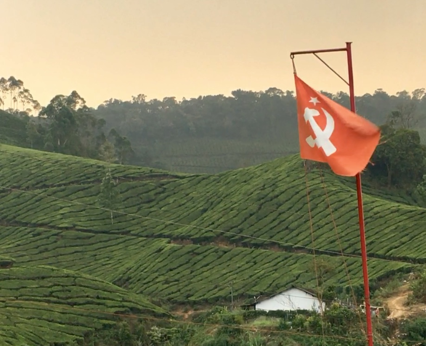By Joey Reinhard
B Arts (Political Economy)/B Economics

Gliding through the rolling hills of TATA’s Munnar tea plantations in Kerala, cars casting fluid shadows over the valley as it falls away below, it’s easy to become intoxicated with the sheer beauty of the region. Each gentle concrete bend reveals another blanket of vivid green, its smooth surface broken only by the hypnotic geometry of rows upon rows ebbing and flowing in parallel, running through the countryside like quilted seams.
But to romanticise and get lost in the aesthetic charm of the tea plantations, is to neglect the presence of a dark underbelly of exploitation that props up the most consumed beverage in the world. Tucked away deep in the enclaves of these hills, women, who form the backbone of the world’s tea industry, are fighting a lop-sided political battle on multiple fronts.
The deep-seated power structures they find themselves pitted against have their roots in a historically embedded patriarchal notion of femininity: women were identified as having delicate, gentle hands, suitable for picking the finest tea leaves. This is a baseless logic informed by normative gendered dichotomy that infuses through the class/caste structure of the region and broader India.
In reality, tea-picking is some of the most labour-intensive work one could undertake. Workers in Munnar’s tea plantations are fourth and fifth generation Tamil, descendent indentured workers brought to the region by British colonisers. Tea plantation pickers are predominantly women, who tough out long days of navigating steep hills, hauling kilograms of tea leaves, all while being subjected to the harsh heat and monsoonal rains of Southern India. This group are core of the workforce, yet women have continually been forgotten by the prominent union movement in Kerala, a state where socialist oriented governments have wielded significant power over the years.
The raison d’être of these well established and party-affiliated unions is to resist the exploitative tendencies of large corporations such as TATA which operate the tea-plantations. However, overrepresentation of men (who primarily work in other sections of the tea production process such as in factories) in these unions has led to lacklustre outcomes for the women pickers.
This overrepresentation of men in union institutional structures reflects longstanding gender inequalities in social, cultural and economic life of India. The rise of autonomous women’s labour organising is the ultimate subversion of this socio-economic structure. The women of the tea fields have taken mobilisation into their own hands.
Our field school was fortunate enough to have an interaction with several of these women. Having organised under the banner of Pembilai Orumai (Women’s Unity, in Tamil), they’ve leveraged their position as the backbone of the industry and initiated ongoing strikes to secure a living wage (having moderate success), and are currently engaged in 20 court cases disputing matters of basic worker’s rights.
The success of these movements, despite being up against both the economic might of the plantation owners and the masculine political culture of the union establishment, and an avalanche of sensationalist rhetoric in the public sphere, speaks volumes for the ability for grassroots mobilisation to bring about significant change. It also highlights just how important it is that the voice of women, and other marginalised groups, are at the forefront of worker organisation if this change is to be truly progressive.

